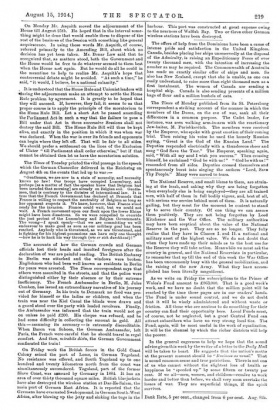The accounts of how the German crowds and German officials
lost their beads and insulted foreigners after the declaration of war are painful reading. The British Embassy in Berlin was attacked and the windows were broken. Englishmen who had been well known as residents in Berlin for years were arrested. The Times correspondent says that others were assaulted in the streets, and that the police were distinguished either by their absence or by their extreme inefficiency. The French Ambassador in Berlin, M. Jules Cambon, has issued an extraordinary narrative of his journey out of Germany. In his train to Denmark no food was pro- vided for himself or the ladies or children, and when the train was near the Kiel Canal the blinds were drawn and a guard stood over the party with loaded revolvers. Finally, the Ambassador was informed that the train would not go on unless he paid £200. His cheque was refused, and he had some difficulty in collecting the amount in gold. All this — assuming its accuracy—is extremely discreditable. When Baron von Schoen, the German Ambassador, left Paris, the French were careful that he should travel in regal comfort. And then, mirabile dicta, the German Government confiscated the train!


































 Previous page
Previous page